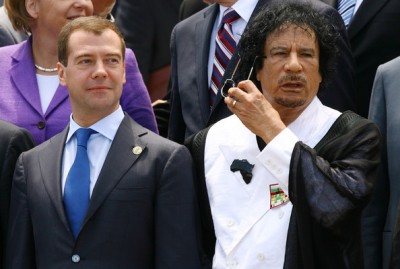Zheng Haoning, Igor Serebryany, Feng Kang
MOSCOW/CARIO, June 1 (Xinhua) — Russian President Dmitry Medvedev strikingly joined the Western powers in urging Libyan leader Muammar Gaddafi to give up power at the latest round of the Group of Eight (G8) summit in the northern French seaside town of Deauville.
Experts and analysts believe Russia made the move to protect its own interests in Libya and have a stake in the country’s future. Yet they remain skeptical over whether Russia could help make a difference in the Middle East country.

File photo of Libyan Leader Muammar Gaddafi and the extended members of the G8 world leaders pose for a "family photo" on the third day of the G8 summit on July 10, 2009 in Italy
WHY THE MOVE?
Ever since the bloody upheaval began in Libya, Moscow’s decision-makers have been busy calculating whether Gaddafi would step down and whether Russia’s interests on the ground could be recognized if the opposition rises to power. And the entangling seasaw battle in Libya made Russia’s final answers hard to come by.
Feeling too early to pick side, Russia followed a more flexible path, condemning both the NATO-led air campaign and the hostile actions against civilians by Gaddafi’s troops.
“The Russian position on the Libyan issue was based on the common BRICS ground of non-involvement in the conflict, of thorough balancing between three parties: the Libyan government, opposition forces and Western powers,” said Fedor Lukyanov, chief editor of magazine Russia in Global Politics.
However, as time goes by, the repeated Western outcry to oust Gaddafi and the escalating Western-led air strikes over Tripoli might have helped Russia to make up its mind.
Said Lawendy, expert of international relations at Egypt’s Ahram Center for Political and Strategic Studies, told Xinhua in a recent interview that NATO won’t halt its interference unless Gaddafi’s regime falls.
Moreover, seeking to protect its interests and stay relevant in the post-conflict Libya is perhaps another key reason.
Russia sees Libya an important partner in the region,having poured billions of U.S. dollars of investment in Libya in sectors like oil exploration, railway construction and arms sales.
Already, a chaotic Libya is crippling Russia’s investment there. According to a recent report on Russia’s RBC daily, the war in Libya could set back Russian oil and gas investment in the country for many years.
Tatneft, a Russian oil firm, has invested heavily in Libya over the past six years, while Gazeprom, Russia’s gas giant, spent some 163 billion U.S. dollars this February purchasing part of the shares of Libya’s Elephant oil and gas production field project. The two companies were forced to suspend their operations and evacuate their workers in Libya because of the ongoing conflict, said the report.
As NATO air raids are gaining further momentum, it’s only natural for Russia to start considering its own role as it cannot afford to stay out of the picture.
Meisant al-Janabi, professor with Russia’s Peoples’ Friendship University, said the Kremlin is attempting to prevent Libya’s future from being shaped only by the West. Medvedev is trying to hedge the risk.
Additionally, some of the Western nations’ promises and offers at the G8 summit also prompted Russia to make the turn.
At the summit, the Western countries pledged to facilitate Russia’s entry into the World Trade Organization by the end of this year while ahead of the summit, France and Russia reached a deal under which Paris would sell four Mistral-class helicopter carriers to Moscow.
“It’s no secret that every world power’s politics is based on its own interests….So Medvedev has done nothing extraordinary. He just showed that Russia has calculated its possible benefits and losses,” professor al-Janabi said.
LIMITED INFLUENCE
Besides demanding that Gaddafi “must go,” Medvedev, who refused to offer shelter to the Libyan leader, also said Russia would like to mediate the crisis, a role Moscow refused to play at the beginning.
But local analysts said Russia has limited influence in Libya, even though Moscow maintains contact with both the government in Tripoli and rebels.
Libya’s Deputy Foreign Minister Khaled Kaim told a press conference Friday that the Libyan government is not concerned about the events at the G8 meeting. It only supports the proposals of the African Union (AU), he said, adding that “Any decision taken about the political future of Libya belongs to the Libyans, no one else.”
Yevgeny Satanovsky, head of the Moscow-based Middle East Institute, expressed his doubt that Gaddafi would agree to leave power. He said Gaddafi would “fight to the end with unpredictable consequences for everyone involved.”
The latest statement from the Libyan government also suggested that Gaddafi’s departure from power is still distant.
Libyan government spokesman Moussa Ibrahim insisted on Tuesday Gaddafi didn’t discuss “any exit strategies” with South African President Jacob Zuma who went to Tripoli for mediation. Ibrahim added that the West is ignoring African Union’s peace package.
Meanwhile, Libyan rebels also questioned Russia’s effectiveness as a mediator.
Libya’s opposition spokesman and Vice Chairman of the National Transitional Council (NTC) Abdel-Hafidh Ghoga said Russia’s offer should have come sooner. “It’s too late, and it’s not a big deal,” he told a rally in Benghazi.
However, Moscow has already started to play an honest broker in the troubled country. And the Russian president chose to begin with the rebels as he declined to send diplomats to Tripoli where the situation remained “more complicated.”
Before visiting Libyan rebels’ stronghold of Benghazi as Medvedev’s envoy, Mikhail Margelov, chairman of the Foreign Affairs Committee of the Federation Council of Russia, said earlier Friday that his mission in Benghazi would be to make certain who the rebels are and what plans they have for Libya’s future.
He also admitted that it was impossible to persuade Gaddafi to relinquish power through dialogues.






















